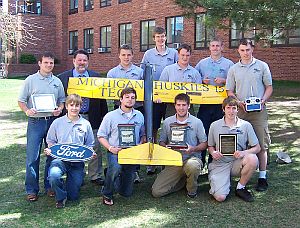
Michigan Tech SAE Aero Design Team |
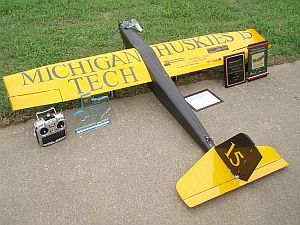
Awards From SAE Aero Design East |
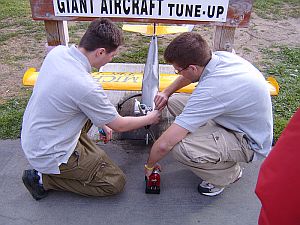
Engine Test at West Contest |
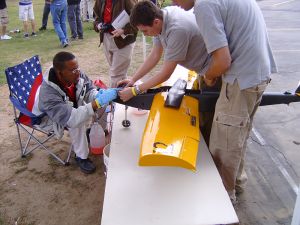
Fueling up at SAE Aero Design West |
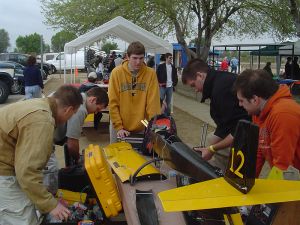
Getting ready for filght at SAE Aero Design West |
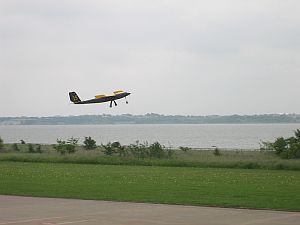
Michigan Tech plane take-off at SAE Aero Design West
|
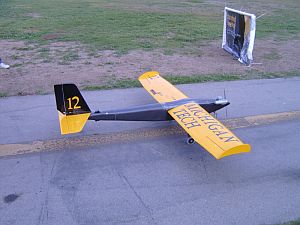
Ready for take-off at SAE Aero Design Wast |
|
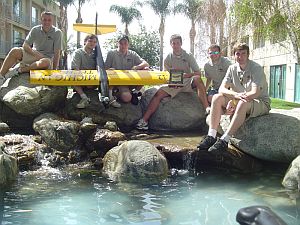
Michigan Tech SAE Aero Design Team at Van Nuys, CA |
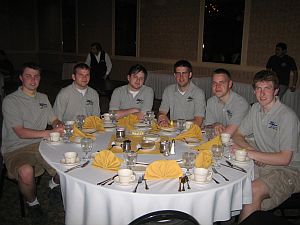
Michigan Tech SAE Aero Design Team at West Banquet |
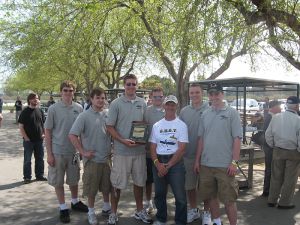
Michigan Tech SAE Aero Design Team with pilot |
|
2007 Aero Design World Champions
Story from Michigan Tech News Bureau
by Marcia Goodrich
Michigan Tech’s SAE Aero Design team flew their radio-controlled plane to a third-place finish in the Society of Automotive Engineers’ Aero Design West, held in March in Van Nuys, Calif. Then they soared to first place in Aero Design East, held May 4-6, 2007 in Ft. Worth, Texas.
“Our SAE Aero team has really progressed over the last four or five years,” said their advisor, Stephen Stackhouse, associate director for corporate development.
The Aero Design Competition challenges engineering students to design and build a radio-controlled aircraft that can take off and land while carrying as much cargo as possible.
All the planes must meet certain criteria, said Raymon Smith, who was the design leader for Michigan Tech’s entry. This year, they had to have a 1,000-square-inch lifting area, an O.S. 61 FX engine and a cargo volume of 4-by-4-by-16 inches. “From that point on, it’s up to the teams,” said Smith, a senior majoring in both electrical and mechanical engineering.
They attempt to take off and land their plane, both loaded with cargo and empty, and to predict how much payload they can carry. In addition, they present oral and written technical reports.
Because flying radio-controlled planes is not a winter sport, the team did not get to test its entry until Aero Design West, where they took third place. Then they used what they learned to win the gold in Ft. Worth. “It was great to hold both awards, know that I designed most of the plane, and that a strong team effort built it,” Smith said.
In addition to good materials, the team focused on reliability. “In the past, we had parts that weren’t rugged enough to handle takeoffs and landings, and we learned a lot from that,” he said. “It really came together.”
Victory was all the sweeter because of the caliber of the competition. Schools from throughout the world entered, and many had the benefit of aerospace programs. The Michigan Tech team made an extra effort to learn aerospace engineering principles and then used fundamentals of mechanical engineering to give themselves an edge. “We really optimized the structure, maintaining rigidity while maximizing strength,” Smith said.
Not everyone did. “A few planes fell apart in mid-air,” he said. “They’d make a sharp turn, and the wings would fold up.”
Michigan Tech’s facilities, especially the space in the MEEM subbasement, allowed the team to perform that all-important preliminary testing that was key to its ultimate success, Smith said.
Smith would like to fly real planes someday. “Once I graduate, I’d like to get my pilot’s license,” he said, “and eventually design my own aircraft.”
In the
2005 SAE Aero East National Student Competition,
our student team placed 11th out of 30 teams.
In 2004
the Michigan Tech Aero Design Team placed 9th overall in the
East competion and 10th overall in the West where they lifted
20.95 lbs, a new record for the team.
They received
the award for the best design report in the West and their
total design score for report, plans, payload prediction,
and presentation was 3rd overall.
See the SAE Collegiate
Design web site for more about SAE
Aero Design®
See the Aero Design
Team
information page
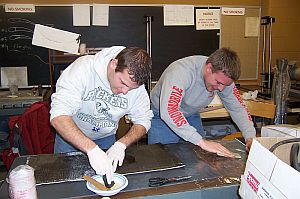
Carbon fiber layup at ME-EM
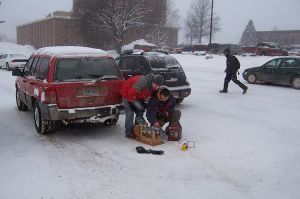
Engine Test
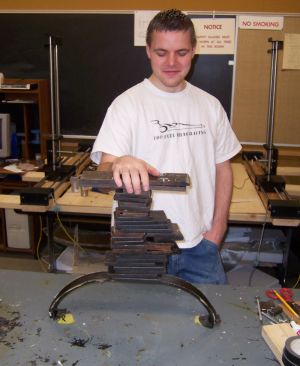
Landing gear test
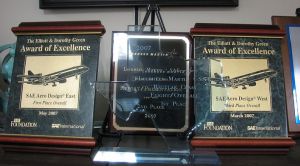
|












